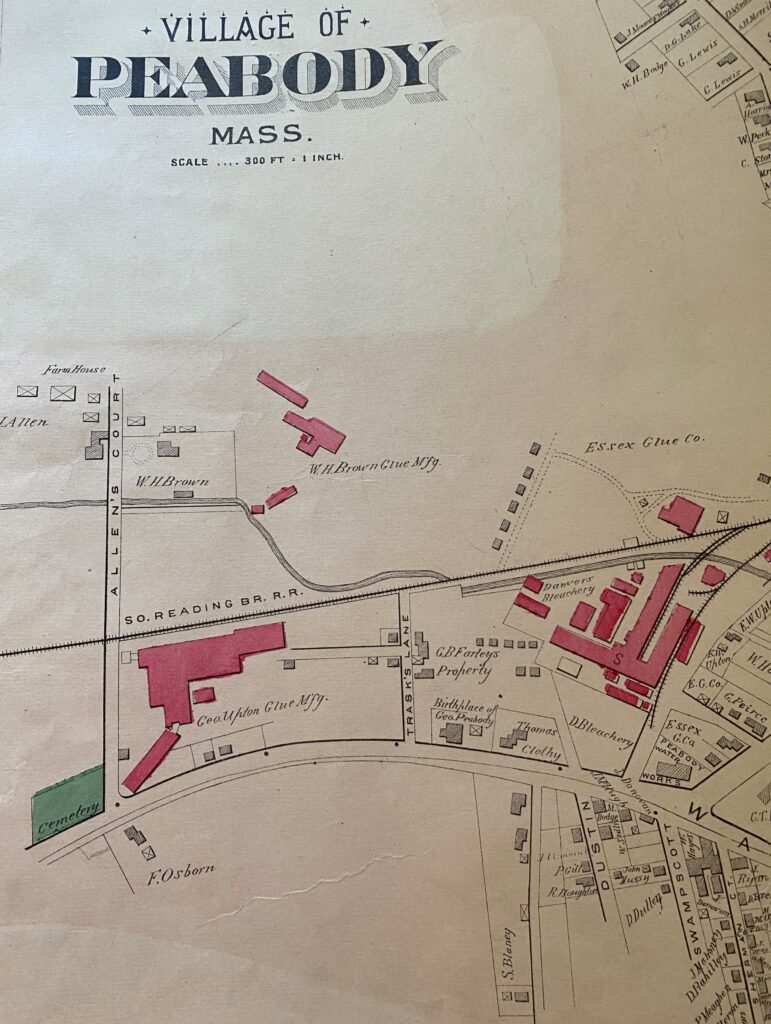With Rousselot scheduled to close in December, we wanted to take a look back at this Peabody institution.

Advertisement, circa 1880, Upton Glue Factory, on Washington Street
Our story actually starts well before Eastman Gelatine comes to Peabody. In 1808, the Upton Glue Factory was formed. In 1894, they were bought by the American Glue Company, expanding their plant at the corner of Allen’s Lane and Washington Street.

1884 Map of Peabody, Published by GW Walker
Corner of Washington Street and Allen’s Court (now Lane); George Upton Glue Factory along Washington Street; WH Brown Glue Mfg. behind Upton, along Allen’s Court

Print from the Essex County 1884 Atlas of W.H. Brown Glue Mfg.
By 1930, the American Glue Company was taken over by Eastman Kodak. The plant began to manufacture photographic gelatine, as well as sizing cloth, paper and adhesive. Not surprisingly, with Peabody’s leather working history, gelatine has a leather connection. Gelatine is created using animal by-products (cattle bones, pig and cow hides, as well as additional chemicals).
Eastman Gelatine’s opening was a boon to the city as it was suffering from the effects of the Great Depression. The company paid their taxes in advance to help the City during this hard financial time. We speak more about Eastman Gelatine’s role in the Great Flood of 1954 in this blog post.

Aerial Image, Eastman Gelatine, circa 1960
The Eastman Gelatine Corporation was a subsidiary of Eastman Kodak. In 1970, Eastman Gelatine was the third highest taxpayer in Peabody, at $5,165,530. At its peak, the Eastman Gelatine campus encompassed 570,000 square feet, in thirty buildings, over 400 acres of land. It acted much like its own town – it had its own power plant, water system, and sewer disposal. The water facilities generated 5,000,000 gallons a day.
In 2011, Eastman Gelatine was taken over by Rousselot. The gelatine created is now for pharmaceutical products.
In 2020, a group of neighbors adjacent Eastman Gelatine filed a class action suit. The plaintiffs “contend the plant frequently exudes noxious, disgusting odors that cause headaches, nausea, and vomiting. Plaintiffs allege that these foul smells have also reduced the value and interfered with their use and enjoyment of their properties.” The case is ongoing.
In early 2023, Rousselot announced it would close its Peabody facility in December and move its gelatine production overseas. It truly is the end of an era.
What are your memories of Eastman Gelatine? Did you work there? Were you a neighbor? We want to hear any memories you would like to share.
References
John Wells. The Peabody Story. Essex Institute, 1972, pages 405-406, 438, 471.
Caroline Enos. “Peabody’s Rousselot Plant Plans to Close at the End of 2023” The Salem News, March 1, 2023.
